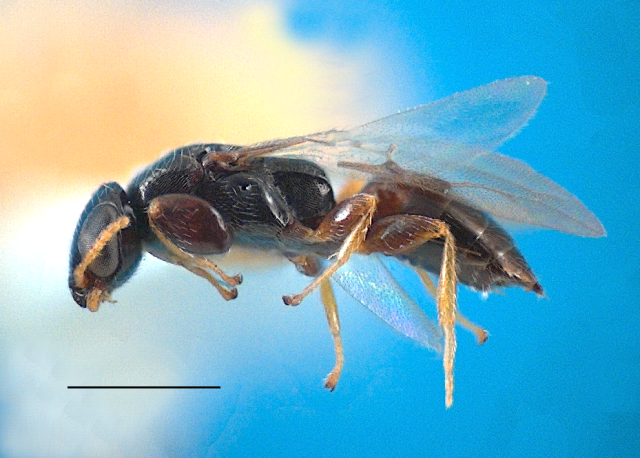Brood guarding in a gregarious parasitoid wasp

New Zealand Hymenoptera [CC BY-SA 3.0]
Examine how a variety of factors influences the brood guarding behaviour of a parasitoid wasp species.
Some species of parasitoid wasps will guard the clutch of eggs or ‘brood’ that they lay on the surface of a host until they pupate. The benefit of this tactic is that it allows for the defence of the exposed eggs against competing parasitoids and predators, but the behaviour of guarding should only evolve when the costs of the behaviour (in terms of loss of other reproductive opportunity) is outweighed by the benefits.
The parasitoid wasp species Goniozus jacintae, is a gregarious parasitoid of leaf-rollers such as the light brown apple moth (LBAM), and will lay multiple eggs on the surface of the host. It was found G. jacintae only remain with the brood on LBAM for an average time of 66 minutes (Hopper and Mills, 2015). The effectiveness of guarding for only this long is somewhat null, as the eggs will remain vulnerable for a matter of days.
Goniozus wasps are typically idiobionts, and will permanently paralyse the host with a sting prior to laying eggs. Hopper and Mills (2015) observed that G. jacintae could only temporarily paralyse the host for a similar length of how long the wasp guarded its brood for.
The student will be able to manipulate a variety of factors to determine how they influence host guarding time. These factors include, but are not limited to, host paralysation status (permanently or temporarily paralysed), host size (larger hosts are a more valuable resource to guard), and host density (the presence of multiple hosts may influence female laying decisions). In addition, the student can observe the change in fitness of the brood when affected by these factors.
You will develop skills in:
- Insect culture rearing
- Experimental design and execution (manipulation + behavioural observations)
- Use of software for behavioural observations
- Use of wind tunnels for experiments
- Statistical analysis
Key References:
Hardy, I. C. & Blackburn, T. M. (1991). Brood guarding in a bethylid wasp. Ecological Entomology, 16, 55-62.
Hopper, J. V. & Mills, N. J. (2015). Consequences of infanticide for a gregarious ectoparasitoid of leafroller larvae. Ecological Entomology, 40, 461-470.
Supervisor
- Dr Maryam Yazdani
- Co supervisors: Professor Mike Keller
- Research area: Entomology and plant pathology
- Recommended honours enrolment: Honours in Agricultural Science
